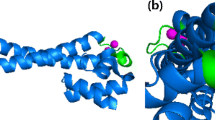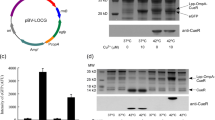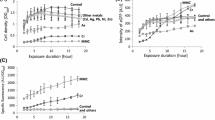Abstract
Metals are essential to all organisms; accordingly, cells employ numerous genes to maintain metal homeostasis as high levels can be toxic. In the present study, the gene operons responsive to metal(loid)s were employed to generate bacterial cell-based biosensors to detect target metal(loid)s. The cluster of genes related to copper transport known as the cop-operon is regulated by the interaction between the copA promoter region (copAp) and CueR, turning on and off gene expression upon copper ion binding. Therefore, the detection of copper ions could be achieved by inserting a plasmid harboring the fusion of copAp and reporter genes, such as enzymes and fluorescent genes. However, copAp is not as strong a promoter as other metal-inducible promoters, such as znt-, mer-, and ars-operons; thereby, its sensitivity toward copper ions was not sufficient for quantification. To overcome this problem, we engineered Escherichia coli with a deletion of copA to interfere with copper export from cells. The engineered E. coli whole-cell bioreporter was able to detect copper ions at 0 to 10 μM in an aqueous solution. Most importantly, it was specific to copper among several tested heavy metal(loid)s. Therefore, it will likely be useful to detect copper in diverse environmental systems. Although additional improvements are still required to optimize the E. coli-based copper-sensing whole-cell bioreporters presented in this study, our results suggest that there is huge potential to generate whole-cell bioreporters for additional targets by molecular engineering.




Similar content being viewed by others
References
Alexander M (2000) Aging, bioavailability, and overestimation of risk from environmental pollutants. Environ Sci Technol 34(20):4259–4265. https://doi.org/10.1021/es001069+
Belkin S (2003) Microbial whole-cell sensing systems of environmental pollutants. Curr Opin Microbiol 6(3):206–212. https://doi.org/10.1016/S1369-5274(03)00059-6
Cooksey DA (1994) Molecular mechanisms of copper resistance and accumulation in bacteria. FEMS Microbiol Rev 14(4):381–386. https://doi.org/10.1111/j.1574-6976.1994.tb00112.x
Foy C, Chaney R, White M (1978) The physiology of metal toxicity in plants. Annu Rev Plant Physiol 29(1):511–566. https://doi.org/10.1146/annurev.pp.29.060178.002455
Hakkila K, Green T, Leskinen P, Ivask A, Marks R, Virta M (2004) Detection of bioavailable heavy metals in EILATox-Oregon samples using whole-cell luminescent bacterial sensors in suspension or immobilized onto fibre-optic tips. J Appl Toxicol 24(5):333–342. https://doi.org/10.1002/jat.1020
Harms H, Wells MC, van der Meer JR (2006) Whole-cell living biosensors—are they ready for environmental application? Appl Microbiol Biotechnol 70(3):273–280. https://doi.org/10.1007/s00253-006-0319-4
Hynninen A, Virta M (2009) Whole-cell bioreporters for the detection of bioavailable metals. Whole Cell Sensing System II Springer, pp 31–63
Hynninen A, Tõnismann K, Virta M (2010) Improving the sensitivity of bacterial bioreporters for heavy metals. Bioeng Bugs 1(2):132–138. https://doi.org/10.4161/bbug.1.2.10902
Javed M, Usmani N (2015) Impact of heavy metal toxicity on hematology and glycogen status of fish: a review. Proc Natl Acad Sci India Section B Biol Sci 85(4):889–900
Juhasz AL, Smith E, Weber J, Naidu R, Rees M, Rofe A, Kuchel T, Sansom L (2008) Effect of soil ageing on in vivo arsenic bioavailability in two dissimilar soils. Chemosphere 71(11):2180–2186. https://doi.org/10.1016/j.chemosphere.2007.12.022
Nivens DE, McKnight T, Moser S, Osbourn S, Simpson M, Sayler G (2004) Bioluminescent bioreporter integrated circuits: potentially small, rugged and inexpensive whole-cell biosensors for remote environmental monitoring. J Appl Microbiol 96(1):33–46. https://doi.org/10.1046/j.1365-2672.2003.02114.x
Outten FW, Outten CE, Hale J, O'Halloran TV (2000) Transcriptional activation of an Escherichia coli copper efflux regulon by the chromosomal MerR homologue, CueR. J Biol Chem 275(40):31024–31029. https://doi.org/10.1074/jbc.M006508200
Rathnayake I, Megharaj M, Krishnamurti G, Bolan NS, Naidu R (2013) Heavy metal toxicity to bacteria—are the existing growth media accurate enough to determine heavy metal toxicity? Chemosphere 90(3):1195–1200. https://doi.org/10.1016/j.chemosphere.2012.09.036
Reid BJ, Jones KC, Semple KT (2000) Bioavailability of persistent organic pollutants in soils and sediments—a perspective on mechanisms, consequences and assessment. Environ Pollut 108(1):103–112. https://doi.org/10.1016/S0269-7491(99)00206-7
Rensing C, Grass G (2003) Escherichia coli mechanisms of copper homeostasis in a changing environment. FEMS Microbiol Rev 27(2–3):197–213. https://doi.org/10.1016/S0168-6445(03)00049-4
Riether K, Dollard M-A, Billard P (2001) Assessment of heavy metal bioavailability using Escherichia coli zntAp::lux and copAp::lux-based biosensors. App Microbiol Biotechnol 57(5):712–716. https://doi.org/10.1007/s00253-001-0852-0
Shetty RS, Deo SK, Liu Y, Daunert S (2004) Fluorescence-based sensing system for copper using genetically engineered living yeast cells. Biotechnol Bioeng 88(5):664–670. https://doi.org/10.1002/bit.20331
Stoyanov JV, Hobman JL, Brown NL (2001) CueR (YbbI) of Escherichia coli is a MerR family regulator controlling expression of the copper exporter CopA. Mol Microbiol 39(2):502–512. https://doi.org/10.1046/j.1365-2958.2001.02264.x
Tom-Petersen A, Hosbond C, Nybroe O (2001) Identification of copper-induced genes in Pseudomonas fluorescens and use of a reporter strain to monitor bioavailable copper in soil. FEMS Microbiol Ecol 38(1):59–67. https://doi.org/10.1111/j.1574-6941.2001.tb00882.x
Van Gestel C, Ma W-C (1988) Toxicity and bioaccumulation of chlorophenols in earthworms, in relation to bioavailability in soil. Ecotoxicol Environ Saf 15(3):289–297. https://doi.org/10.1016/0147-6513(88)90084-X
Acknowledgements
This study was supported by Konkuk University in 2016 (to Y.Y.).
Author information
Authors and Affiliations
Corresponding author
Ethics declarations
Ethical statement
This article does not contain any studies with human participants or animals performed by any of the authors.
Conflict of interest
The authors declare that they have no conflicts of interest.
Electronic supplementary material
ESM 1
(PDF 193 kb)
Rights and permissions
About this article
Cite this article
Kang, Y., Lee, W., Kim, S. et al. Enhancing the copper-sensing capability of Escherichia coli-based whole-cell bioreporters by genetic engineering. Appl Microbiol Biotechnol 102, 1513–1521 (2018). https://doi.org/10.1007/s00253-017-8677-7
Received:
Revised:
Accepted:
Published:
Issue Date:
DOI: https://doi.org/10.1007/s00253-017-8677-7




